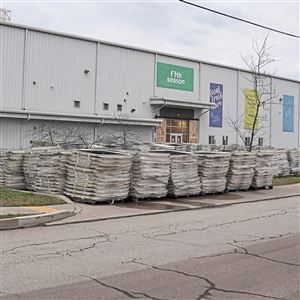Wherever I am, I'm filled with sediment:
with tough, dirty Pittsburgh
where the mountains of black rock &
half mills are carapaces.
-- from "Notes on a Nevada Flood"
Deals are struck and broken on street corners and in the privacy of bedrooms and trains, rage and loss are whipped out and shaken, and a tender balance is ultimately achieved in Jan Beatty's "The Switching/Yard," a wrenching, erotic new collection of poems about coming to terms with one's past by navigating the gritty landscape of the heart.
It's Ms. Beatty's fourth book from the Pitt Poetry Series. A major figure in Pittsburgh's writing community, she co-hosts the weekly radio show "Prosody" on WESA-FM and directs the creative writing program at Carlow University, where she runs the Madwomen in the Attic writing workshops. She also creates and inspires poetry across the country.
In Part I, "California Corridor," Ms. Beatty takes us on a journey into a family history that's been torn and patched together so many times it's difficult to see where the seams end and the pattern begins. In the poem "Sister as Moving Object," about keeping a deadly secret, Ms. Beatty writes about the dangerous alliances that occur between two sisters:
she raised me up taught me the necessary things:
how to mix water with bourbon in the picture-frame bar
how to mix the real and the unreal and make it glisten
sea of submerged heartache ...
Ms. Beatty mixes the real and the unreal in her portraits of life in Pittsburgh, her search for her birth family, and her musing on the gods that guide and torment us. Her trademark wry humor holds her in good stead as we follow her from the homeless woman with a gimmick begging outside the Carnegie Library to the lonely landscapes of the California dust bowl to the icy provinces of Canada, where she goes to seek her birth father.
In "Three Faces and All These Fallen Gods," a stream-of-consciousness poem about hunger in its many forms, she writes:
... I am filled
with magical thinking: my father has certainly eaten here,
his DNA here, I am in his seat in Winnipeg with three faces
and all these fallen gods/ sinking into the tre visi:
three faces of longing, loss and desire --
wanting him to walk in, say, I've been looking for you.
Younger, I spent too many years wishing men
could say something hotter than I could think of -- they never did.
Part II, "The Switching/Yard," brings us into desire, fulfilled and unfulfilled: desire for a home, for sex and love, for escape at whatever cost. Highlights include two letter poems: "Stein: Letter to a Young Rilke" and "Dear American Poetry," a future classic destined to be quoted gleefully across all the cafe tables of America.
The final poem in "The Switching/Yard" section, "The Body Snatchers," is about being orphaned, a theme that runs throughout the book. The poem ends with the rueful lines:
you wanted her
grateful --
never wanted her
real.
The final section, "Approaching Denver/Union Station," is the most lyrical and unexpected: It is about the trials and hard-earned rewards of piecing together a life from fragments.
Artfully weaving together family myths with pop culture -- Jim Morrison, "Texas Chainsaw Massacre" -- Ms. Beatty juxtaposes lyricism with brutality, vulnerability with toughness, and horror with beauty until we are reeling with color and sensation.
In the poem "Lovely," Ms. Beatty pulls back the curtain to show a rare and naked moment of wistfulness:
Outside now: my night bird, my
mockingbird calling another's song
and in my stumblings I am alive,
nothing more --
my night is a segmented heart/
my sun, the birdsong of day,
I know nothing about.
"The Switching/Yard" takes us on an unforgettable quest through two countries, through crack dens and ghost railyards, beat-up cars and rolling orchards, to the final soaring words of love and redemption. It is, in simplest form, the story of fighting to find one's place in a shattered world. In the title poem of this powerful collection, Ms. Beatty beautifully sums up the true meaning of homecoming and the current of hope that surges through even her darkest words:
I'll find the switching/yard: this train and that,
those who made you, and, in that distant
but bloody kingdom way -- me,
so I can stand and say, here.
First Published: April 7, 2013, 8:00 a.m.















